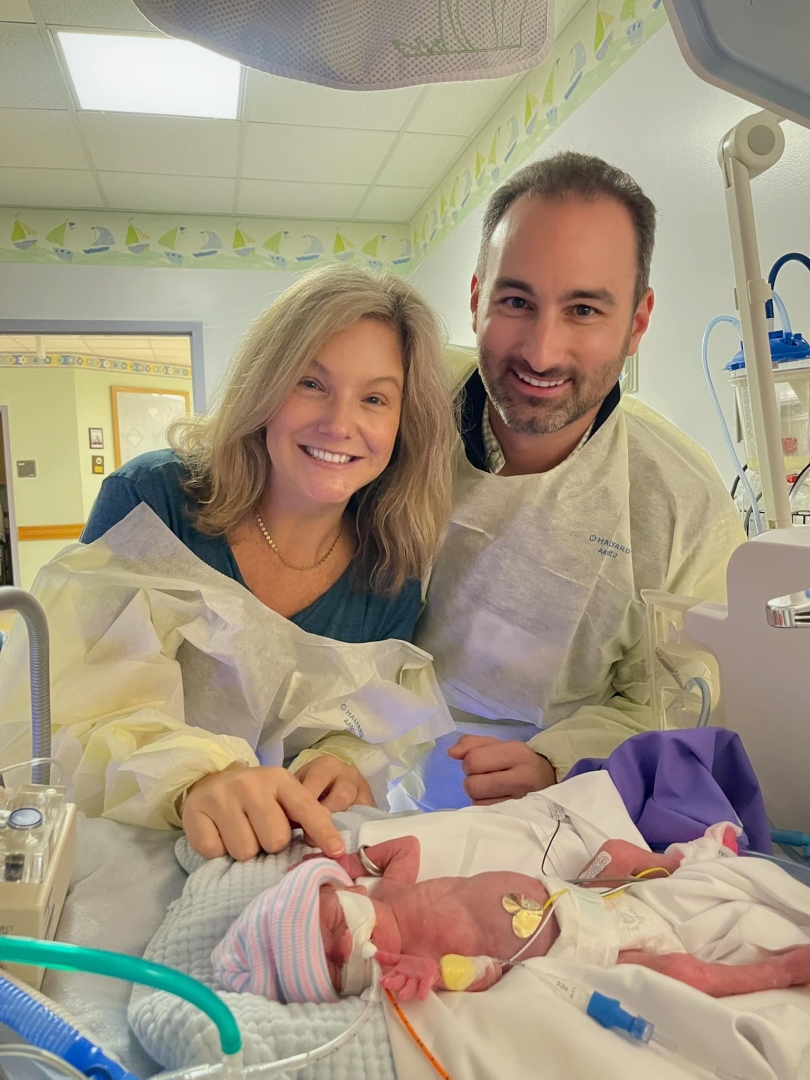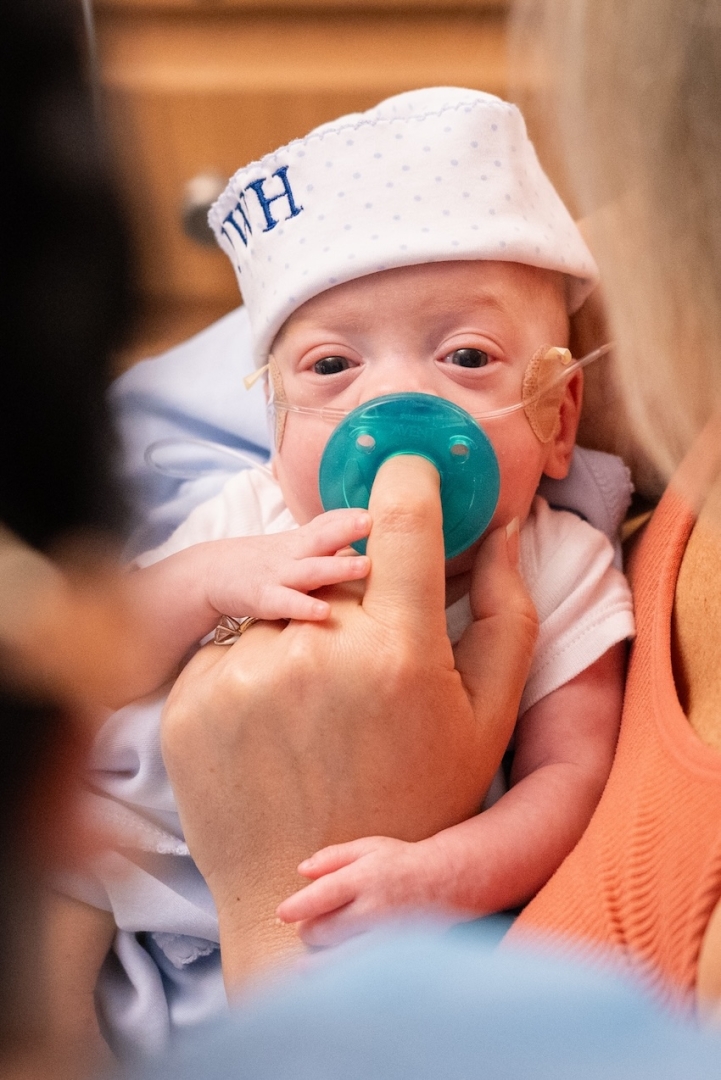During her second trimester, Christie Homola was planning her "babymoon" to New York City with her husband, Jaeson. However, after a routine checkup at TMH Physician Partners - Maternal-Fetal Medicine at 23 weeks into her pregnancy, everything changed for Christie and Jaeson.
At that appointment, William Dobak, DO, told Christie that she needed to go straight to the Tallahassee Memorial Obstetric Emergency Room. Her blood pressure was 186, qualifying her for a hypertensive emergency. Christie was shocked – she felt completely fine and thought Dr. Dobak was being overly cautious.
Once there, her obstetrician, Lindsay Hinson, MD, FACOG, with North Florida Women's Care, came to her bedside to explain a protein urine test. If the protein/creatine ratio in her urine returned lower than 0.3%, Christie could return home and go about her normal routine. However, if it was higher, she would be diagnosed with preeclampsia. When her test results returned at 9.5%, she was quickly admitted to the Antenatal Care Unit (ACU) at the Tallahassee Memorial Alexander D. Brickler, MD Women's Pavilion.
Preeclampsia is a complication in pregnancy of high blood pressure and high levels of protein in urine that indicate kidney damage or other signs of organ damage. It is a leading cause of premature birth.
An Urgent Situation
It was mid-November, and the expectant parents planned to be in the ACU until Christie’s scheduled cesarean section (c-section) on Valentine’s Day. However, during her week in the ACU, Christie started feeling worse. She gained 25 pounds of fluid in her body while her organs began to shut down.
Members from TMH’s Neonatal Intensive Care Unit (NICU) consulted with the Homolas on what to expect from an early delivery. The team shared that if Christie delivered before 28 weeks, her baby would have a 60% chance of survival. While Christie was determined to make it to 28 weeks, her body only gave her five more days before her heart began to stop working.
 On Nov. 20, a team of doctors, nurses, respiratory therapists and other medical personnel joined Dr. Hinson in the operating room for a c-section. The team prepared Christie and Jaeson for the worst, sharing that they might not be able to hear him cry at first, and he would need to be taken to the NICU immediately.
On Nov. 20, a team of doctors, nurses, respiratory therapists and other medical personnel joined Dr. Hinson in the operating room for a c-section. The team prepared Christie and Jaeson for the worst, sharing that they might not be able to hear him cry at first, and he would need to be taken to the NICU immediately.
When it came time to decide their baby boy's name, Christie and Jaeson knew they would need a tough name since their baby had a fight ahead of him. They chose the strongest name they knew – Jack – after Christie's dad and grandfather. Both men were trained boxers, and her grandfather was a marine in World War II.
Meeting Jack
At 7:57 am, Jack was born, weighing 1 pound, 7 ounces and was 11 inches long. Jaeson was able to cut his umbilical cord before the NICU team took over.
"He came right out, and I didn't see him. He went straight from my uterus to a bag to keep him warm," shared Christie. "He let out a little cry, and I remember thinking, 'Thank you, God, thank you.'"
Jack was intubated by NICU respiratory therapists and taken to the TMH Level III NICU, the highest level of care in the region. The first day, Jaeson was able to visit Jack while Christie recovered, but Christie was determined to see him and went to the NICU the following day.
Born before 28 weeks and weighing less than 1,000 grams, Jack was considered a 'micro-preemie.' As the region's only Level III NICU, TMH provides critical intensive care services for babies in the Big Bend area born as early as 23 weeks and weighing less than 2.2 pounds.
With one layer of skin, ears that were not completely formed, underdeveloped lungs requiring intubation, a feeding tube, a hole in his heart, risk of having a brain bleed and requiring an incubator to regulate his body temperature, Jack had many challenges to overcome.
"I didn't know TMH had a Level III NICU until we were preparing to have Jack early, and it is outstanding," shared Christie. "The acute medicine continuously blew me away; it's the best in North Florida! Our community should be proud to have this level of care."
The medical staff prepared Christie and Jaeson that Jack would likely have a brain bleed; it was just a matter of severity. However, after completing scans during the first two days, the parents were relieved to hear Jack did not have one.
Jack did have patent ductus arteriosus (PDA), a small hole in his heart. In the womb, infants have a temporary blood vessel that allows blood to bypass the lungs. With premature babies, it's common that this hole does not close quickly after birth like it does with full-term babies. The PDA caused extra blood to flow into Jack’s tiny lungs, increasing pressure and straining his heart. His lungs were underdeveloped, which made every movement more strenuous.
His obstacles did not stop there; Jack's blood sugar was higher than normal due to donor breast milk, and he developed a blood infection while in the NICU, requiring isolation from other infants.
 A Roller Coaster Ride
A Roller Coaster Ride
Jack continued to fight, and little by little, his complications resolved: at 28 weeks, his PDA closed, at 29 weeks, he was extubated and slowly progressed to a low-flow nasal cannula, and at 35 weeks, he was bottle feeding.
"His time here was special," shared NICU Nurse, Desiree Fenniman, BSN, RN. "It's always great to see families grow through the challenges with their baby then walk out of here with everything they wanted to happen."
On Feb. 5, 2025, Jack moved to TMH's Level II NICU – a less intensive unit – and his parents were hopeful he would be home soon. His time there was short-lived, though. After two days, he developed pneumonia and moved back to the Level III NICU. While this was a setback, Jack once again overcame his illness and continued to exceed expectations.
"Jack's progression in the NICU was like a roller coaster ride," said Respiratory Therapist Alicia Reagle, RRT. "We had some ups and downs, but he's a fighter. He's very strong and was able to overcome those challenges."
Graduation Day Comes
After 97 days in the NICU, Jack “graduated” 10 days before Christie would have reached 40 weeks in her pregnancy and was able to go home with his mom and dad.
"I'm so grateful for his health. He has crushed every single milestone… Every goal set for him, he's passed with flying colors," Jaeson recounted.
A month after Jack graduated from the NICU with oxygen support, his pulmonologist shared that he can slowly wean off support. His cardiologist also gave him a clean bill of health two months after being home.
Jack sees an ophthalmologist for his stage two retinopathy of prematurity, a disease in which abnormal blood vessels grow in the retina. This mild stage of the disease usually gets better without treatment, and babies often go on to have healthy vision.
"Our doctors and nurses did as much as they could medically," said Christie. "I think God took over the rest, and we had a lot of prayers. And I'm telling you, when you're in the NICU, there are guardian angels in there. You can feel them."
Support Families Like the Homolas This TMH Day
This TMH Day, June 12, we’re calling on our community to help support families like the Homolas who received life-saving care from TMH’s Antenatal Care Unit (ACU) and Neonatal Intensive Care Unit (NICU). Your donation to the TMH Foundation allows TMH to continue providing the highest level of care to moms and babies. Visit TMHDay.org to give in honor of baby Jack or your own NICU graduate.
Give TodayTo learn more about the region’s only Level III NICU and pre-register to give birth at TMH, visit TMH.ORG/NICU.

